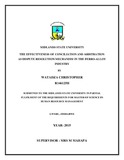Please use this identifier to cite or link to this item:
https://cris.library.msu.ac.zw//handle/11408/2182| Title: | The effectiveness of conciliation and arbitration as an alternate dispute resolution mechanism in the ferro – alloy industry: a case of Zimasco and Zimbabwe Alloys International. | Authors: | Watadza, Christopher | Keywords: | Conciliation and arbitration, dispute resolution mechanism | Issue Date: | 2015 | Publisher: | Midlands State University | Abstract: | The research evaluates the effectiveness of conciliation and arbitration as an alternate dispute resolution mechanism in the Ferro – Alloy Industry. A case of ZIMASCO and Zimbabwe Alloys International, 2 major players in the industry, were examined in a descriptive research design. Backing the research is the concept of legal pluralism which then defined conciliation and arbitration as alternative dispute resolution systems. A sample size of 35 comprising of Management and Trade Union representatives, general employees and Labour Officers participated through interviews, semi – structured and unstructured questionnaires with the response rate of 100%. The research established that conciliation and arbitration’s strength as mechanism for dispute resolution lies on their accessibility, flexibility, cost effective and less adversarial nature and has contributed towards the effective resolution of disputes in some instances. However the research uncovered that despite the aforementioned strengths of conciliation and arbitration, the current legal framework was not providing a conducive and enabling regulatory environment to ensure an effective dispute resolution mechanism. The gaps in terms of time limits, the absence of explicit guidelines on conciliation, lack of finality to arbitral awards were identified as major drawbacks of the current legal structure. The State department, the Ministry of Labour, is the vehicle for an effective dispute resolution mechanism. The research identified that the department was inadequately resourced to enable speedy and prompt resolution of disputes. Due to the centrality and inevitability of disputes at workplace, the research recommended that government should amend the current legal framework to align it to International Labour Organisations provisions on conciliation and arbitration to ensure an effective resolution to disputes. | URI: | http://hdl.handle.net/11408/2182 |
| Appears in Collections: | Master Of Science In Human Resource Management Degree |
Files in This Item:
| File | Description | Size | Format | |
|---|---|---|---|---|
| Watadza - Dissertation .pdf | Full text | 881.73 kB | Adobe PDF |  View/Open |
Page view(s)
136
checked on Jan 14, 2025
Download(s)
268
checked on Jan 14, 2025
Google ScholarTM
Check
Items in MSUIR are protected by copyright, with all rights reserved, unless otherwise indicated.


